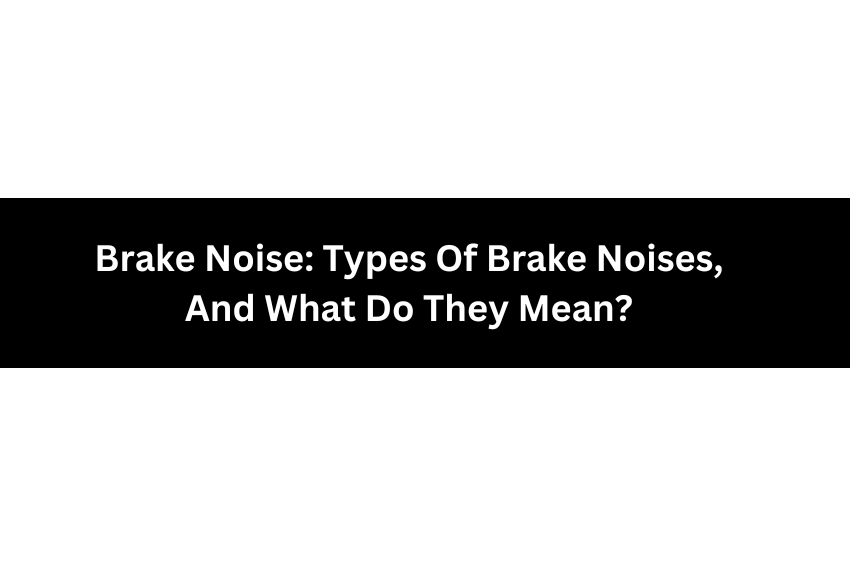Brake noise refers to any unusual sound, such as squeaking, grinding, or squealing, that occurs when you apply your car’s brakes.
It can be caused by worn brake pads, dust buildup, improper alignment, or damaged components.
While some noise is normal, persistent noise may indicate a potential brake issue.
What Are The Common Types Of Brake Noises, And What Do They Mean?
Let’s go through the most common brake noises and what they mean.
Squeaking Or Squealing Brakes
Suppose you hear a squeaking or squealing noise when braking, it’s often caused by worn brake pads.
Most brake pads have a small metal piece that makes a noise to warn you they’re getting thin.
Moisture, like rain or dew, can also make your brakes squeak, but this usually stops after a few uses.
You should check your brake pads to avoid further damage if the noise doesn’t go away.
Grinding Noises From Brakes
Grinding sounds are one of the more serious brake noises.
It usually means your brake pads are completely worn out, and the metal backing is rubbing against the rotors.
This can damage the braking system and lead to expensive repairs.
Grinding noises should never be ignored, as they can affect your car’s safety.
Rattling Or Clicking Brakes
Rattling or clicking sounds when braking might mean your brake calipers or other parts are loose.
This noise is common in older or poorly maintained vehicles.
Tightening the loose parts or replacing damaged components can usually fix this issue.
If the noise continues, it’s best to get a professional inspection.
Hissing Or Air-Like Noises
A hissing noise can signal a problem with the hydraulic brake system or a vacuum leak.
These issues can reduce your car’s stopping power and are dangerous.
You’ll need a mechanic to inspect and fix this problem quickly.
How Can I Fix Brake Noise On My Own?
If you’re hearing brake noise like squeaking or grinding, you can often fix it yourself without going to a mechanic.
Follow these easy steps to fix brake noise at home and save money.
Remember, safety first.
Always wear protective gear and make sure your car is secure before starting.
1. Check The Brake Pads
The most common cause of brake noise is worn-out brake pads.
If your pads are too thin, they need to be replaced.
To check, remove the wheel and look at the brake pads.
If the thickness is below a quarter of an inch, replace them.
You can buy new brake pads at an auto parts store and install them yourself if you’re comfortable.
2. Clean The Brake Pads And Rotors
If your brakes are squeaking due to dust or dirt, cleaning them can help.
Use a brake cleaner spray to clean both the brake pads and brake rotors.
This will remove any debris and stop the squeaking.
Be sure to follow the instructions on the cleaner for the best results.
3. Tighten Loose Brake Components
A clicking or rattling noise might come from loose brake calipers or other parts of the brake system.
Check to make sure the brake calipers are tight and securely attached.
If they’re loose, use the right wrench to tighten them.
Make sure you don’t over-tighten, as this can cause damage.
4. Inspect For Brake Dust
Brake dust can build up between the brake pads and rotors, causing noise.
Clean off any brake dust with a soft brush or cloth.
If there’s too much buildup, use brake cleaner to clean the area thoroughly.
What Are The Best Ways To Prevent Brake Noise In The Future?
- Check your brakes regularly (brake pads, rotors, and fluid).
- Replace worn brake pads with high-quality ones.
- Clean brake parts to remove brake dust.
- Drive smoothly and avoid hard braking.
- Lubricate brake components (calipers and moving parts).
- Use ceramic brake pads for less dust and quieter performance.
- Ensure proper brake pad alignment with rotors.
- Replace brake fluid when it’s low or old.
- Avoid cheap brake parts; invest in quality components
Related Post:
Why Do My Brakes Squeak When I First Start Driving? (2024 Guide)
Why Are My Brakes Grinding When I Stop?
5 Reasons Why Brakes Still Grinding After Replacing Pads And Rotors
